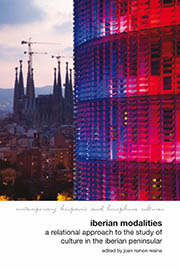Book contents
- Frontmatter
- Contents
- Preface
- List of Contributors
- Introduction: Iberian Modalities: The Logic of an Intercultural Field
- Part I Institutionalizing Iberian Studies: A Change of Paradigm
- Part II Theorizing Iberia
- Part III Iberian Dialogs
- 8 Asymmetry and the Political: Paradigms for a Cultural History of the Iberian Twentieth Century
- 9 Sins of the Flesh: Bullfighting as a Model of Power
- 10 Jews and Jewishness in Carme Riera's Dins el darrer blau
- 11 Mediterranean Exemplarities: The Case of Medieval Iberia
- Part IV From Sea to Iberian Sea
- Works Cited
- Index
10 - Jews and Jewishness in Carme Riera's Dins el darrer blau
from Part III - Iberian Dialogs
- Frontmatter
- Contents
- Preface
- List of Contributors
- Introduction: Iberian Modalities: The Logic of an Intercultural Field
- Part I Institutionalizing Iberian Studies: A Change of Paradigm
- Part II Theorizing Iberia
- Part III Iberian Dialogs
- 8 Asymmetry and the Political: Paradigms for a Cultural History of the Iberian Twentieth Century
- 9 Sins of the Flesh: Bullfighting as a Model of Power
- 10 Jews and Jewishness in Carme Riera's Dins el darrer blau
- 11 Mediterranean Exemplarities: The Case of Medieval Iberia
- Part IV From Sea to Iberian Sea
- Works Cited
- Index
Summary
Las hogueras del fanatismo y la ortodoxia son una constante del siglo XXI, en el que ya estamos. Seguimos proyectando nuestro peor yo sobre los débiles, los pobres y los emigrantes. Necesitarí amos matar el yo racista que llevamos dentro y eso sólo se puede conseguir colocándonos en el lugar del otro, sintiéndote agredida.
(Carme Riera in Martí Gómez 12)In the last twenty-five years, Jews have emerged as a literary figure as well as a literary theme in Spain. Catalan writers such as Maria Àngels Anglada (1930- 99), Carme Riera (1948–), and Vicenç Villatoro (1957–) approach the Jewish theme and the representation of the Jew as literary character in order to reflect on issues regarding identity and history in novels, such as El violí d'Auschwitz (1994), Dins el darrer blau (1994), and Memòria del traïdor (1996), respectively. With Dins el darrer blau, written between 1989 and 1993, published in Catalan in 1994 and in Castilian in 1996, Riera starts a series of novels dedicated to the Majorcan xuetes (Jews who were converted to Christianity) which she finishes with Cap al cel obert in 1999. In this essay I will reflect on how Riera's Dins el darrer blau revisits the past in order to create a “culture of memory,” a process in which society confronts its traumatic past and the history of exile and repression, linking the history of the Jewish converts to the history of the Balearic island, Majorca. Riera's novel is based on historical events that occurred in the City of Majorca from 1687 to 1691.
- Type
- Chapter
- Information
- Iberian ModalitiesA Relational Approach to the Study of Culture in the Iberian Peninsula, pp. 162 - 177Publisher: Liverpool University PressPrint publication year: 2013

